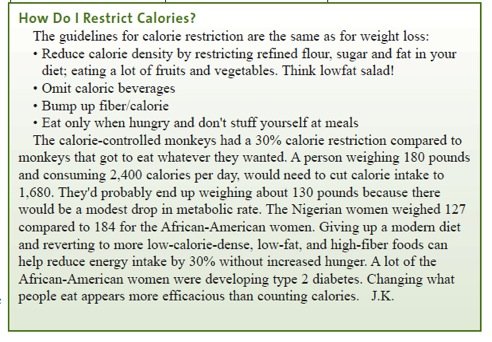Calorie Restrictions Slows Aging
Calorie Restrictions Slows Aging
The only well established intervention to significantly increase the maximal life-span of many short-lived mammalian species and other lower animals is calorie restriction (CR). It also slows the deterioration of most physiological functions that are associated with the aging process.
CR also significantly increases the average life expectancy of these animals. It does this in part by retarding the development of many degenerative diseases such as type 2 diabetes, cardiovascular diseases and cancer. Some researchers have been skeptical about the potential for CR to slow the aging process in higher mammals including humans and other primates.The impact of CR on longevity is greatest when started early in life and in some species has increased maximal life span by over 50%. However, CR started early in life severely stunts growth and interferes with sexual maturation and reproductive success so even the proponents of CR in people believe it should not be started before adulthood. In lower mammals like rodents starting calorie restriction in young adulthood or middle age still increases maximal life expectancy and delays or prevents the onset of many degenerative diseases including those who that take the lives of most Americans.However, this increased life expectancy is more on the order of 10 to perhaps 30%. Even so that might add 10 to 20 healthy years for an average young person. Restricting an animal?s calorie intake by 20 to 40% is generally what seems to work best all things considered.An important question then, is would CR work if started in adult primates? To answer this question Dr. Weindruch and his colleagues began a CR study on 30 young adult male Rhesus monkeys back in 1989. Five years later 30 female monkeys and 16 more males were added to the study. All the monkeys were between 7 and 14 years old when they entered the study. The control group did not have their energy intake restricted. But the monkeys assigned to the experimental group were fed 30% fewer calories than the controls over the past 20 years.The average life expectancy for rhesus monkeys is about 27 years in captivity with a maximum life span of 40 years. That means each monkey year is equal to about 3 human years. The average age of the surviving monkeys in both groups is now in their late 20s. In the control group, 21 of 38 have already died compared to 14 of 38 in the CR group.However, some of the deaths in both groups were the result of complications with anesthesia, injuries, or illnesses not related to aging.Of the deaths due to age-related diseases such cancer, diabetes, and cardiovascular disease there were nearly 3 times as many deaths in the control versus the experimental group (14 versus 5 deaths, respectively) and this difference was statistically significant.The results were reported in the July 13, 2009 issue of Science. None of the monkeys in the CR group have developed type 2 diabetes, which is now common among the monkeys that ate freely. This is perhaps not surprising given that type 2 diabetes appears to be largely promoted by excessive calorie intake.Unfortunately the calorie dense fatty animal products and refined carbohydrates foods that make up much of the modern diet of humans provides less satiety per calorie than a more natural diet consisting of more fruits and vegetables. The result is that the average calorie intake of Americans has been increasing and the number of Americans with type 2 diabetes is reaching pandemic status. We know that insulin resistance is largely reversed when calorie intake is reduced and excess weight is lost. Certainly eating 30% fewer calories per day of modern foods is not feasible because their lack of satiety would require people to live with chronic hunger.However, a study comparing African-American women with Nigerian women found that the later consumed about 30% fewer calories than their American counterparts but none were counting calories or going hungry.Bottom Line:We now have convincing evidence that CR slows the aging process in primates in a similar fashion to lower mammals suggesting that humans too would age more slowly if their calorie intake was reduced. By James J/ Kenney, PhD, RD, FACN
By James J/ Kenney, PhD, RD, FACN
 By James J/ Kenney, PhD, RD, FACN
By James J/ Kenney, PhD, RD, FACN